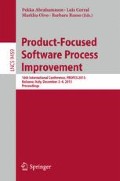Abstract
We present a novel method for capturing and writing requirements specifications that enriches disciplined use cases with screen mockups. Disciplined use cases are characterized by a quite stringent template, which allows to impose a large number of constraints helping to prevent common mistakes and to increase the quality of the specifications. Disciplined use cases are expressed using natural language, but the strong structuring allows to reach a good level of precision without having to introduce new (and more complex) notations. Screen mockups associated with the steps of the scenarios present the corresponding GUIs as seen by the human actors before/after the step executions, improving the comprehension of the requirements, and allowing also to precisely present non-functional requirements of the user interface. The method has been successfully applied in an industrial project and the effectiveness of the screen mockups has been validated by means of controlled experiments.
Access this chapter
Tax calculation will be finalised at checkout
Purchases are for personal use only
References
Astesiano, E., Cerioli, M., Reggio, G., Ricca, F.: A phased highly-interactive approach to teaching UML-based software development. In: Proceedings of Educators Symposium at MoDELS 2007, pp. 9–18. University of Goteborg (2007)
Astesiano, E., Reggio, G.: Knowledge structuring and representation in requirement specification. In: Proceedings of 14th International Conference on Software Engineering and Knowledge Engineering, SEKE 2002, pp. 143–150. ACM (2002)
Briola, D., Amicone, A., Laudisa, D.: Ontologies in industrial enterprise content management systems: the EC2M project. In: Proceedings of 5th International Conference on Advanced Cognitive Technologies and Applications, pp. 153–160. IARIA (2013)
Choppy, C., Reggio, G.: Improving use case based requirements using formally grounded specifications. In: Wermelinger, M., Margaria-Steffen, T. (eds.) FASE 2004. LNCS, vol. 2984, pp. 244–260. Springer, Heidelberg (2004)
Cockburn, A.: Writing Effective Use Cases. Addison Wesley, New York (2000)
Ferreira, J., Noble, J., Biddle, R.: Agile development iterations and UI design. In: Proceedings of Agile Conference, AGILE 2007, pp. 50–58 (2007)
Hartson, H.R., Smith, E.C.: Rapid prototyping in human-computer interface development. Interact. Comput. 3(1), 51–91 (1991)
Leotta, M., Reggio, G., Ricca, F., Astesiano, E.: Towards a lightweight model driven method for developing SOA systems using existing assets. In: Proceedings of 14th International Symposium on Web Systems Evolution, WSE 2012, pp. 51–60. IEEE (2012)
O’Docherty, M.: Object-Oriented Analysis and Design: Understanding System Development with UML 2.0. Wiley, Hoboken (2005)
Reggio, G., Leotta, M., Ricca, F., Astesiano, E.: Business process modelling: five styles and a method to choose the most suitable one. In: Proceedings of 2nd International Workshop on Experiences and Empirical Studies in Software Modelling, EESSMod 2012, pp. 8:1–8:6. ACM (2012)
Reggio, G., Ricca, F., Leotta, M.: Improving the quality and the comprehension of requirements: disciplined use cases and mockups. In: Proceedings of 40th Euromicro Conference on Software Engineering and Advanced Applications, SEAA 2014, pp. 262–266. IEEE (2014)
Ricca, F., Scanniello, G., Torchiano, M., Reggio, G., Astesiano, E.: On the effectiveness of screen mockups in requirements engineering: results from an internal replication. In: Proceedings of 4th International Symposium on Empirical Software Engineering and Measurement, ESEM 2010, pp. 17:1–17:10. ACM (2010)
Ricca, F., Scanniello, G., Torchiano, M., Reggio, G., Astesiano, E.: On the effort of augmenting use cases with screen mockups: results from a preliminary empirical study. In: Proceedings of 4th International Symposium on Empirical Software Engineering and Measurement, ESEM 2010, pp. 40:1–40:4. ACM (2010)
Ricca, F., Scanniello, G., Torchiano, M., Reggio, G., Astesiano, E.: Assessing the effect of screen mockups on the comprehension of functional requirements. ACM Trans. Softw. Eng. Methodol. 24(1), 1:1–1:38 (2014)
Rivero, J.M., Grigera, J., Rossi, G., Luna, E.R., Montero, F., Gaedke, M.: Mockup-driven development: providing agile support for model-driven web engineering. Inf. Softw. Technol. 56(6), 670–687 (2014)
Scanniello, G., Ricca, F., Torchiano, M., Gravino, C., Reggio, G.: Estimating the effort to develop screen mockups. In: Proceedings of 39th Euromicro Conference on Software Engineering and Advanced Applications, SEAA 2013, pp. 341–348 (2013)
Zhang, J., Chang, C., Chung, J.Y.: Mockup-driven fast-prototyping methodology for web requirements engineering. In: Proceedings of 27th International Computer Software and Applications Conference, COMPSAC 2003, pp. 263–268. IEEE (2003)
Author information
Authors and Affiliations
Corresponding author
Editor information
Editors and Affiliations
A Precise Use Cases with Screen Mockups Specification Well-Formedness Constraints
A Precise Use Cases with Screen Mockups Specification Well-Formedness Constraints
See [11] for the definition of the form of the requirement specification based on disciplined use cases augmented with screen mockups.
Rights and permissions
Copyright information
© 2015 Springer International Publishing Switzerland
About this paper
Cite this paper
Reggio, G., Leotta, M., Ricca, F. (2015). A Method for Requirements Capture and Specification Based on Disciplined Use Cases and Screen Mockups. In: Abrahamsson, P., Corral, L., Oivo, M., Russo, B. (eds) Product-Focused Software Process Improvement. PROFES 2015. Lecture Notes in Computer Science(), vol 9459. Springer, Cham. https://doi.org/10.1007/978-3-319-26844-6_8
Download citation
DOI: https://doi.org/10.1007/978-3-319-26844-6_8
Published:
Publisher Name: Springer, Cham
Print ISBN: 978-3-319-26843-9
Online ISBN: 978-3-319-26844-6
eBook Packages: Computer ScienceComputer Science (R0)

